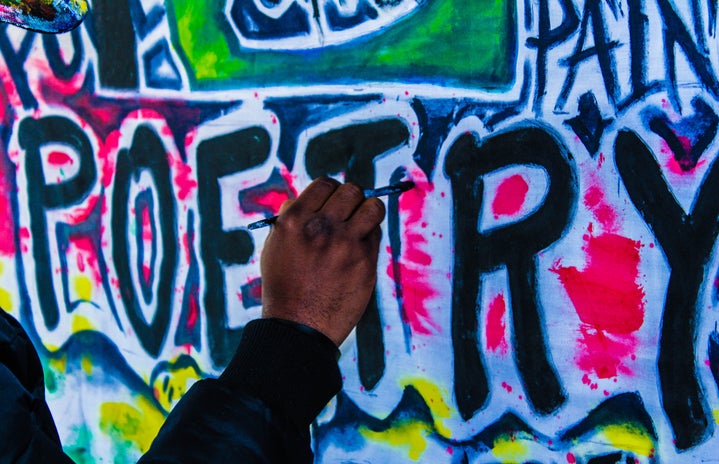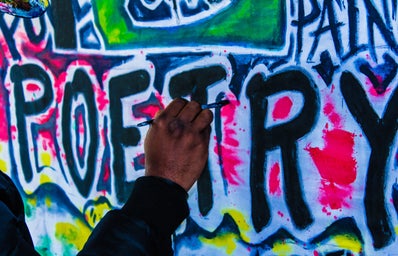If you do a quick Google search on Jay Bernard, 34, there are a number of things that you will learn. Firstly, you will learn that they are a London-based writer and activist, having experimented with art, film programming, fiction and non-fiction. Secondly, you will find out that they work with London’s LGBT+ film festival. Thirdly, you will find examples of their published works and where they have been published. And finally, you will learn that they have won several awards, including the 2017 Ted Hughes award for their collection Surge, as well as the 2020 Sunday Times and University of Warwick Young Writer of the Year Award. Impressive, right? But what you may not learn is that they worry about misrepresenting the communities and individuals that they advocate for, or how surprisingly introverted they are, a contrast to the portraits plastered on The Guardian and Poetry Archive. And what you certainly will not learn is that Jay Bernard is partial to a chai latte.
But these are the things that matter the most. They show who Jay Bernard is, not just what they’ve done. And isn’t that what writing is all about? Your teachers told you to ‘show, don’t tell’ for a reason. For something to connect to, to put yourself into the place of another, to create stories that both the reader and writer can experience, together. As an English Literature and Creative Writing student, I like to think that I take as many opportunities as possible to listen to and speak with other artistic people. After all, for me, university is about growth, academically and personally. And so, in a bid to better understand how the creative mind works, from the perspective of a published writer, I went to a performance by Jay Bernard.
All in all, the talk lasted just over an hour, though Jay did hang around afterwards for additional questions. Excuse the first-name basis, but it feels the most appropriate given the deeply expressive nature of their performance. How could I not refer to someone so inspiring on a first-name basis? Most of the session comprised of readings and discussions on Surge, their debut poetry collection. The work is based off of the 1981 New Cross fire, a birthday party in which 13 young black lives were lost, as well as a later suicide. To this day there have been no charges and government officials are suspiciously silent, bringing no justice to those that were affected. In their talk, Jay argued that the tragedy was a “catalyst for the first unified movement for black people here in Britain”. Surge stems off of this, exploring the build-up to the fire, the aftermath, the family reactions and all that was lost. At the same time, it celebrates life, using dub poetry and reggae sounds to keep Black British culture alive despite a societal tendency to oppress it.
From a writer’s perspective, I wholeheartedly understand Jay Bernard’s emphasis on research. They advocated the use of archives in both finding inspiration and ensuring you have a broad understanding of historical events. In the Q&A section, Jay admitted that they are “always worried about the politics of misrepresentation”, especially when fatalities have occurred. This multi-faceted perspective was evident in their work, where their first reading was from the perspective of a deceased son and his anguish at how the father sees him at the morgue, and the last reading was a song exploring “how many times has Misty died?”. One phrase that really stands out to me in the former is “he takes my head and places it in a plastic bag”, a brutally vivid image. Leading on from this, the narrator’s fear and confusion is impossible to ignore. I couldn’t help but insert myself into the story, imagining how I would feel if I started the night at a birthday party and ended it at a crime scene. This poignancy raised the hairs on my arm, particularly when the narrative focused on the father seeing the son. “Couldn’t stand the sight of me. That’s the way police look at me,” is how Jay wrote it. The link between racial discrimination from officers and the disgust from a father is a painful one. We know about racism and police brutality from social media or personal experiences, but few of us know intimately about lives taken far too soon. Jay Bernard asked themselves this in the Q&A session, saying “who am I to be writing this stuff?”, a question I’m sure many writers can relate to. In my opinion, I think Surge would be entirely different if they didn’t explore this ‘stuff’, the deeply personal and true. Yes, the words are difficult, but that is exactly what makes writing brilliant. Writing is about life, so what would life be if not difficult? That’s my view anyway.
The contrast between blank space and noise is obvious in Surge, Jay doing so to highlight the, at times, ignorant nature of society. Jay Bernard is giving the victims of the New Cross fire what they never had, a chance to be heard. I personally loved the narrative shifts, often changing perspectives from victims of the fire to more general black voices. For me, it showed the importance of looking at people as individuals, not just where they come from or what they look like. Another phrase that has great meaning to me is “I said it in such a whisper, the ground could have fallen asleep.” Even now, a mental image is conjured of Jay halting their movements, fingers outstretched, back slightly hunched as they softly speak this phrase. It was as though Jay channelled the voices of those who needed to be heard, in that moment speaking on behalf of the Black British community.
In their reading, Jay Bernard noted that fellow poet Alice Oswald was a huge inspiration, especially in the midst of writing. Oswold won the 2017 Griffin Poetry Prize and has multiple published works. She is also the first woman to be appointed as an Oxford University Professor of Poetry, a position she’ll hold from 2019-2023. Her content varies, mostly intermingling British rivers with parenthood and love. On the surface, this contrasts to Jay Bernard’s exploration in Surge, though the poet claims Oswald was a huge influence. Jay said their collection “has a lot of looseness about it, a lot of dark space” just as Oswald’s Slowed-Down Blackbird explores an “openness, open-endedness, fluidity” (as Bernard described in the reading). Between them, the idea of possibility is overwhelming, a key feature in general writing. I find it interesting how widely different Alice Oswald’s lifestyle is to Jay Bernard’s, one being married with three children in Devon and the other a London-based artist deeply in the creative community, yet both have similarities in their work.
If I could summarise Jay Bernard’s performance in three words, it would be: passionate, intimate and inspiring. During it, I forgot entirely about my own life, my own problems, and was immersed entirely into the world of Surge. I’m so grateful that Jay Bernard was open to questions, conversations even, because it was invaluable to me from a writer’s perspective. To learn how other’s think and how this is evident in their work is a source of interest to me. After all, what’s an English student if they don’t enjoy reading? And what’s a Creative Writing student if they don’t like the craft? In truth, it was a relief to learn that, like me, Jay Bernard felt they are “not one of these people who are blessed with being able to write.” To know that a published writer also struggles with writing down words and organising them is a relief. One thing that really struck out to me was Jay’s admission that “I sent [publishers] 20 versions of Surge,” highlighting the difficulty of getting published work. Overall, I am grateful to have been given the opportunity to see Jay Bernard, both in appreciation of their work and to inspire my own creative work. They have made me excited for the future.


